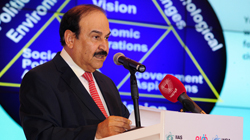

The activities of the 29th International Conference of Public Administration, hosted by the Kingdom of Bahrain under the patronage of His Royal Highness the Prime Minister from June 1st to the 6th, 2013 and organized by the Bahrain Institute of Public Administration (BIPA) in collaboration with the International Institute of Administrative Sciences (IIAS) and the International Association of Schools and Institutes of Public Administration (IASIA), concluded its activities in Manama today.
The conference attracted more than 400 prominent participants such as academics and administrators in the areas of public administration from 70 countries in the world to discuss “The Future of Public Administration: Leadership and Professionalism”
On the fifth day of the conference, a plenary session titled “Political Relations: Management and Leadership” was moderated by John Halligan, from Anzog Institute for Governance and speaking at the session were Casper Van Drbek from the University of Leiden in Netherlands and Minister of Electricity and Water Affairs (EWA) Dr. Abdul Hussein Mirza who gave a lecture. The session addressed the nature of relations between politicians and senior civil servants to compare recent experiences from around the world. The session also addressed all the elements that control the nature of the relationship between politicians and administrators, types of relationships governing them, and the impact of leadership and professionalism on the relationship among politicians and administrators. Other lectures were also given by Gelase Mutahaba from the University of Dar Al-Salam in Tanzania, and Andrew Podger from the Australian National University (ANU).
The panel on Middle Eastern women's roles in public administration was chaired by Governor Dr. Najat Zarrouq from the Ministry of Interior in the Kingdom of Morocco, Dr. Fatima Al Balooshi from the Bahrain Minister of Social Development, Hanan Al Ahmadi, a member of the Shura Council in Saudi Arabia and Laila El Baradei from the Faculty of Economics and Political Science at Cairo University. The session dealt with several important themes including the impact of the Arab Spring on Arab women. The panel presented the challenges and opportunities women around the world and specifically women in the Arab -Muslim world face and how to promote female leadership in the public service. This panel was important because it’s the first time in the history of international conferences of public administration was this topic, the roles of women in public administration, highlighted.
The plenary session chaired by Jennifer Bremer, head of political programs and public administration at the American University in Cairo, highlighted “Research in Public Administration in the Middle East”. The speakers were Salem Nasser from King Saud University in Saudi Arabia, Ayoub Aspeer from Turkey, Professor Robert Fouchet from University Aix-Marseille-France and Yasser Al Alawi, the Advisor at Bahrain Center for Strategic, International, and Energy Studies.
The second plenary session on “Training for Future Public Sector Capacity Building” saw the participation of three lecturers, namely Dr. Frannie Léautie of the African Organization of Zimbabwe Capacity Building Program, Rashid Al Abbasi, from The National School of Administration in Tunis, and Albert S. Kim, from the United Nations Centre for Regional Development. This session was moderated by Professor Soonhee Kim from the Campbell Institute for Public Relations in the United States of America and Gelase Mutahaba from University of Dar es-Salaam in Tanzania. It tackled the impact of training on improving the performance of the public sector and touched upon the necessary knowledge, key skills and abilities for boosting government performance quality. During the meeting, views on local experiences in a number of countries were exchanged.
A number of researchers and practitioners of public administration from the Kingdom of Bahrain participated in the workshops and working sessions organized by IIAS and IASIA and presented a number of working papers. Some of the working papers were on “Human Rights” by Dr. Hamad Al Khalifa from the Ministry of Interior, on “The Main Task of the Future Leader” by Ahmed Bozbar, and a working paper on “Leadership in the Third Awakening Era “presented by Abdul Aziz Ahmed.
